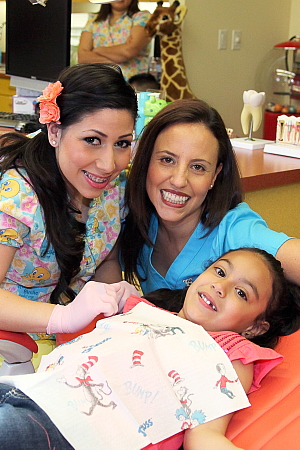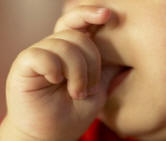 Click on a topic below for more information: Click on a topic below for more information:
Is there something I should do before
my baby gets teeth?
When will my baby get
teeth?
When should I start cleaning my baby's
teeth?
When should my
baby first see a pediatric dentist?
How does
the dentist work with a toddler?
How can I protect my child from getting ECC?
What about breastfeeding and
tooth decay?
What if my toddler won't let me
brush?
What if a child under 3 years
of age needs a lot of dental work?
What should I do about my child
thumb sucking or pacifier?
What are the most important dental health concepts
for children between 3-6 years of age?
How often should my child have
a dental checkup?
What is Sealant?
Do I need to give my
child fluoride vitamins?
For more information concerning pediatric dentistry,
please visit the website
for the
American Academy of Pediatric Dentistry.
Establishing a pattern of
separating eating and sleeping while your baby is
small is very important. Feed the baby, and then
wipe off the gums with gauze square or a cotton
towel. This separates eating from sleeping and gets
the baby accustomed to mouth cleaning routines.
Keeping the bottle out of the crib allows the baby
to learn to sleep through the night at a younger
age, and avoids a later struggle over taking away
the bedtime bottle.
Usually at about six months, but there is a
huge variation between different babies. Some start
erupting their teeth soon after they are born which
makes them very prone to cavity, and some are
toothless until they are 18 months old. The order in
which the teeth erupt is almost always the same. The
lower anterior teeth usually come in first.
As soon as they erupt through the gums. You
may use a gauze square or a little terrycloth finger
cover or baby size soft bristle toothbrush. Place
the brush squarely against the tooth at the gumline
and brush side to side and massage the gum. You may
use an infant toothpaste or just wet toothbrush. At
age three years old, you may place a pea size kid’s
toothpaste on the toothbrush and ask your child to
spit. If they swallow a small portion of the
toothpaste , it is Ok. Keep toothpaste out of the
reach of young children; some children eat Is
toothpaste as a treat.
The American
Academy of Pediatrics recommends that one year of
age is a good time to have a first exam. This lets
the parent and dentist get an early start on a
prevention program that will keep decay away and
minimize other dental problems too. If you see any
suspicious spots on your baby's teeth, particularly
if the teeth came in early or the baby has been
taking a bottle to bed, don't wait. Bring the baby
any time you suspect a problem.
We use knee-to-knee
position with the parents who holding the child in
their arm and placing the head to the doctor knee.
Many children accept this procedure happily, but
even if there is a little crying, we are able to do
the exam. We usually do not recommend a cleaning
until two years of age.

Dental caries is a disease of the teeth caused by
bacteria, suger and tooth. Certain types of bacteria
will produce acid if the bacteria is feeding on
sugars or fermentable carbohydrates. This acid will
break down the mineral structure of the teeth, and
the result is a cavity. ECC is defined as the
presence of a cavity in a tooth in a child under six
years of age. The most common cause of ECC is by
taking a bottle with anything liquid such as Milk,
formula, and juice before napping or sleeping( water
is fine). When the baby is sleeping, its saliva is
not washing across the teeth to protect them from
decay acid. Nearly 100% of tooth decay in infants
and toddlers is caused by the nighttime bottle, and
ECC is the largest cause of dental procedures for
children between 12 and 36 months.
You need to wean your child
from the bottle, nursing, or drinking from Sippy cup
before bedtime. If you are not able to successfully
wean your child you should replace the milk or juice
with plain water. When the child is sleeping, the
saliva does not wash over the teeth to give
protection from decay acid. Brush your toddler's
teeth twice a day in a thorough way and avoid
candies, juice, and sticky fruits such as raisin as
a snack. See your pediatric dentist for their first
exam by the age of one.
Breast milk contains lactose so
it can cause decay when children nurse during the
night. Children who have had their teeth erupted
early and who nurse for many short periods or stay
attached to the mother while they sleep are
particularly at risk. You should wipe your baby’s
gums and teeth with a clean cloth after each feeding
Many toddlers resist. You may
introduce the toothbrush as a toy at first. Allow
the toddler/ or infant to brush independently with
your supervision while you brush your own teeth.
Then after you should go over their brushing as a
game. If all fails place the toddler's head in your
lap, and brush their teeth. This may be a two
parent activity for a while, but don't give up.
It is often surprising how much
cooperation we can get from very young children. But
when the amount of work to be done is beyond a
child's ability to cooperate, we have the
qualifications to provide oral sedation and nitrous
oxide sedation.

 The pacifier should be taken
away from the child between the age of 12 to 18
months. You may wean the child gradually or just
take the pacifier away completely at once. There is
not much we can do about thumb sucking before three
years old that is both effective and kind. So we
suggest just a low key effort to minimize the time
spent sucking. Since the pacifier is not attached to
the child, we can exert a little more control. After
infancy, use the pacifier only for sleep and real
distress. Don't automatically bring it to the store,
to church, to the doctor. When the child can
communicate, don't volunteer the pacifier at night
until the child asks for it. The ideal time for the
child to be weaned from the pacifier is from 12 to
15 months of age. The pacifier should be taken
away from the child between the age of 12 to 18
months. You may wean the child gradually or just
take the pacifier away completely at once. There is
not much we can do about thumb sucking before three
years old that is both effective and kind. So we
suggest just a low key effort to minimize the time
spent sucking. Since the pacifier is not attached to
the child, we can exert a little more control. After
infancy, use the pacifier only for sleep and real
distress. Don't automatically bring it to the store,
to church, to the doctor. When the child can
communicate, don't volunteer the pacifier at night
until the child asks for it. The ideal time for the
child to be weaned from the pacifier is from 12 to
15 months of age.
There are two. First, get
regular dental checkups for your child. Even
children with apparently clean teeth who don't seem
to eat much sugar often develop small cavities.
Since the "nerve" in baby teeth is only two
millimeters from the outside surface, the decay has
often reached this critical area by the time parents
see the cavity. Regular checkups keep dental work
simple for the children and inexpensive for their
parents. The second important thing to remember is
that six-year molars are permanent teeth. This fact
is often overlooked because no baby teeth are lost
when the six-year molars come through the gums. They
are the first permanent teeth to erupt, the largest,
and the most important of all the permanent teeth.
Six month checkups are best for
most children. Some children with good oral hygiene
and no dental cavities may be seen annually.
Sealant is a protective
covering made of composite (plastic filling) which
protect and seal the top surface of the tooth where
there have pits and grooves. It is highly
recommended for the permanent molars usually around
six years of age. It will not protect the other
surfaces of the tooth, therefore brushing and
flossing are still necessary to prevent dental
decay. We also recommend this procedure for primary
molar, if your child is cooperative or need other
dental treatment.
Only if the water your child
usually drinks has less than O.6mg/L fluoride. You
can determine this by calling your water company,
your pediatrician, or your pediatric dentist.
Bottled water for both home delivery and market sale
comes in both fluoride and non-fluoride types.
Reverse osmosis (RO) home filters and market water
dispensing machines remove fluoride. If your home
address changes, be sure to research the fluoride
content of your new water supply, even if your water
company does not change. Some water companies supply
water from different sources to different service
areas within their systems.

|



